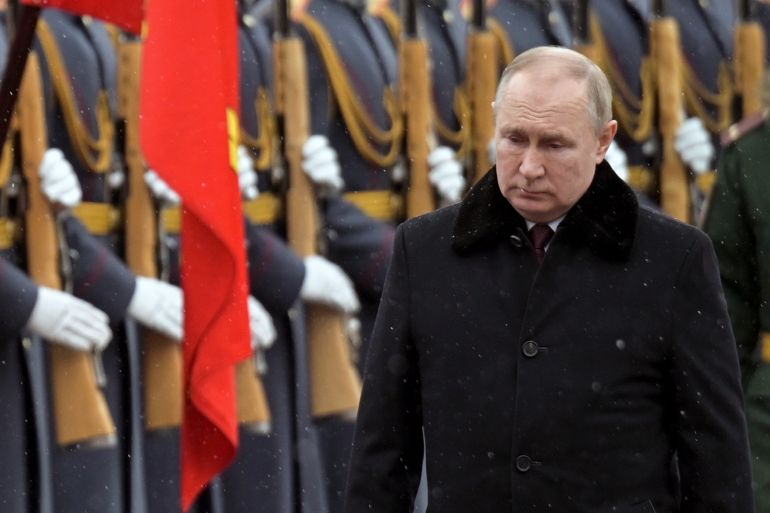Ukraine: EU sanctions Russia defence minister, military chief
Details of sanctions designed to ‘hurt a lot’ also target military chiefs, Kremlin chief of staff and top editor at state-run RT.

The European Union has imposed sanctions on Russia’s defence minister Sergei Shoigu, the country’s military chiefs, and other people close to the Kremlin in response to the escalating crisis in Ukraine.
The 27-nation group says it is freezing assets and imposing visa bans on high-ranking officials that include not only the heads of Russia’s army, navy and air force, but President Vladimir Putin’s chief of staff, and the editor-in-chief of state-run English language television channel RT, according to the EU’s official journal.
Keep reading
list of 4 itemsWall Street closes lower as US expands sanctions against Russia
Latest Russia-Ukraine updates: Tens of thousands flee their homes
Ukraine imposes state of emergency, summons citizens home
Western countries have toughened sanctions on Russia since the country announced it was recognising two breakaway regions of eastern Ukraine as independent and would send troops there, a move that was condemned repeatedly in an emergency session of the United Nations Security Council on Monday night.
“That illegal act further undermines Ukraine’s sovereignty and independence and is a severe breach of international law and international agreements,” the EU said in announcing the latest sanctions, which were agreed to at a meeting in Paris on Tuesday.
Flagging the plan alongside French Foreign Minister Jean-Yves Le Drian then, EU foreign policy chief Josep Borrell said: “The sanctions will hurt Russia and will hurt a lot.”
The details were released as Moscow said the rebel areas had sought its “help” over alleged Ukrainian aggression while Ukraine’s President Volodymyr Zelenskyy warned that Russia could be on the brink of starting a “major war in Europe”.
The EU said those on the blacklist had been involved in military aggression against Ukraine, taking key political decisions, or propaganda on the situation on behalf of the Kremlin.
The Internet Research Agency (IRA) – accused of spearheading Kremlin-backed online disinformation campaigns – was targeted.
“The company conducts disinformation campaigns targeting Ukraine’s agenda by influencing elections or perceptions of the annexation of Crimea or the conflict in Donbas,” the EU said. “The Internet Research Agency is responsible for actively supporting actions, which undermine and threaten the territorial integrity, sovereignty and independence of Ukraine.”
It noted the IRA was funded by Yevgeny Prigozhin, a close Putin ally who is thought to be the founder of Wagner, the mercenary group accused of sending fighters to Ukraine and other conflict zones. He has already been blacklisted by the EU – over Wagner’s involvement in Libya – but his wife and mother were added to the list.
Others targeted for their alleged involvement in spreading Kremlin propaganda include RT’s Margarita Simonyan, foreign ministry spokeswoman Maria Zakharova, and pro-Kremlin broadcasters Vladimir Solovyev and Pyotr Tolstoy.
Three prominent banks VEB, Rossiya – described as the “personal bank of Senior Officials of the Russian Federation” – and Promsvyazbank were also sanctioned.
The EU also moved to limit access to Moscow’s sovereign debt to European financial markets, and imposed a ban on imports from Donetsk and Luhansk territories.
The EU has said the sanctions are just the first part of a package of “unprecedented” measures it has prepared against Russia and that it is holding the rest back in case the Kremlin launches a full-scale attack on Ukraine.
The United States has also targeted Russia’s sovereign debt and certain banks in sanctions announced on Tuesday, while the United Kingdom targeted five banks and three oligarchs. Germany has suspended certification of the Russian-owned Nord Stream 2 pipeline, while Australia, Japan and Canada have also announced measures.